Columbia encampments became crucible for antisemitism. Universities can't condone hate - Kelly
- Oops!Something went wrong.Please try again later.
Under a golden sun on a recent morning earlier this week in the Morningside Heights neighborhood of New York City, life seemed to brim with the kind of hopefulness that comes with spring. Cherry trees blossomed. Sparrows chirped in the oaks and maples. Students at Columbia University shed their winter jackets for T-shirts.
Demographic statistics tell us that this piece of landscape is one of the most progressive corners of America. So why are so many liberal-minded people accepting a new neighbor that is so intolerant?
I’m referring here of the so-called “People’s University of Palestine,” which occupies a patch of landscape no bigger than two football fields on the southwest corner of the central quadrangle at the heart of the Columbia campus.
The People’s University of Palestine — can we call it PUP? — has been described as an ad hoc tent encampment to protest Israel’s military campaign on the Gaza Strip and, more broadly, Israel’s treatment of Palestinians. The tented village has also been called the Gaza Solidarity Encampment. The immediate goal is to persuade Columbia to cancel its investments in Israeli companies and cut its academic ties to Tel Aviv University.
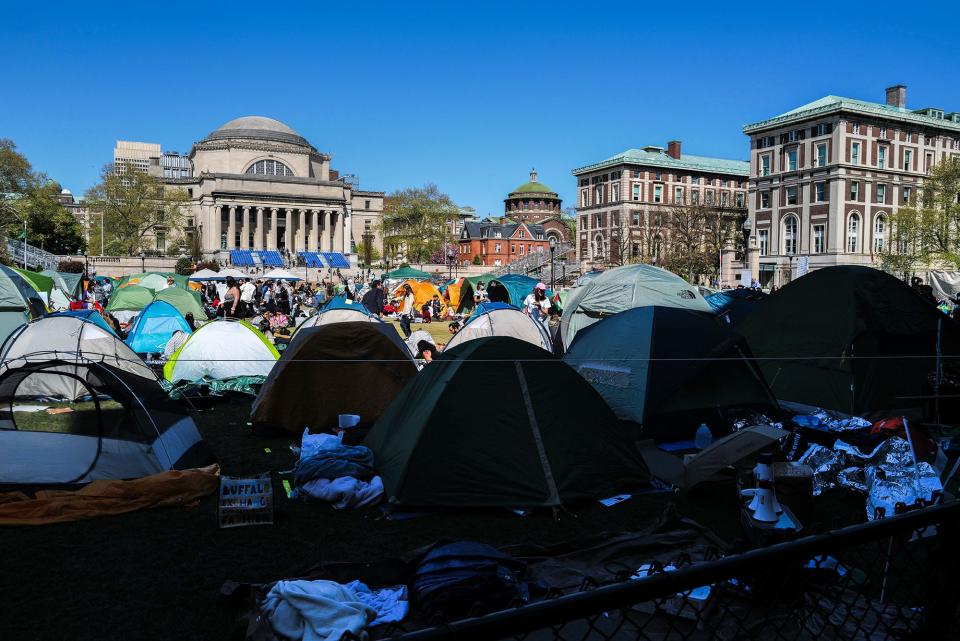
But something far worse is happening. The People’s University of Palestine has become a crucible for one of the world’s oldest forms of bigotry: antisemitism. All this, by the way, comes in the name of a convoluted vision of free speech and academic freedom.
I have seen the worst of the Israeli-Palestinian conflict while on assignment in the Middle East.
As the sun set one evening some years ago not far from the West Bank Palestinian city of Ramallah, I watched Israeli soldiers, equipped with American-made M16 rifles, shoot a Palestinian boy in the head. The boy’s “crime”? He threw rocks toward the soldiers. None of the rocks even came close to hitting any soldier.
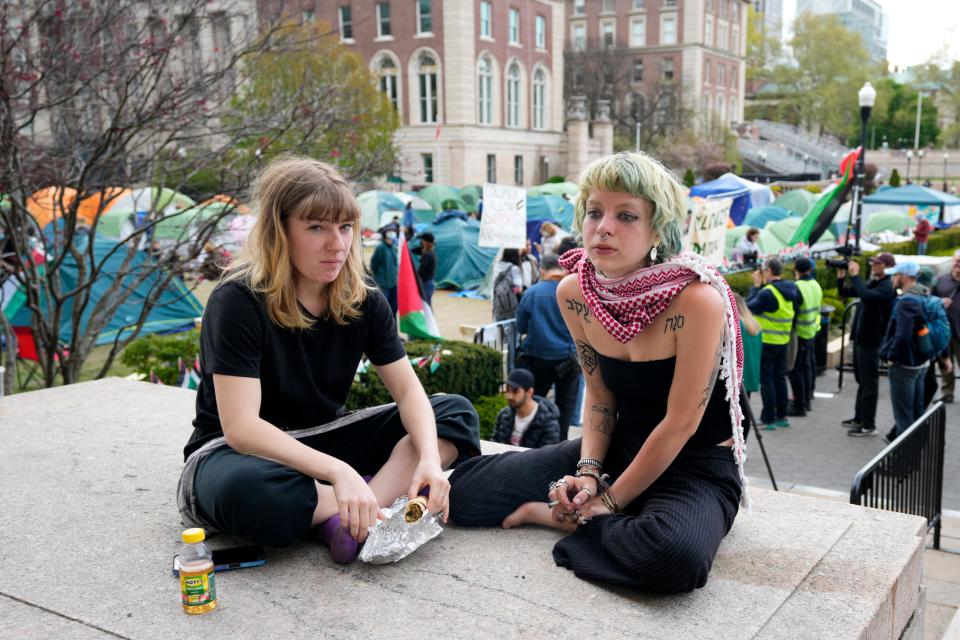
On another disheartening day, in an Israeli prison, a Hamas operative looked me in the eye and coldly told me he was following Allah’s will when he built a bomb that killed dozens of innocent Jews, Christians and Muslims on a Jerusalem bus, including several Americans. He was serving more than 40 life sentences but didn’t seem to mind. Allah, he said, would approve.
The age-old Israeli-Palestinian conflict is, to put it mildly, an intractable mess, drenched in too much blood and warped righteousness on both sides. The destruction across Gaza by the Israeli military and the barbarism of last Oct. 7 by Hamas are just the latest chapter in pain. It will take years to sort through the cruel physical and psychological rubble.
But now that conflict has come to America. Columbia University’s campus is just the latest battlefield.
Demonstrations spike across prominent American campuses
More than 100 blocks away from Morningside Heights, in Greenwich Village, New York University was home to its own Palestinian encampment until police dismantled it this week and arrested some 100 protesters. A plywood wall was erected to keep the encampment from returning. NYU is also the target of a civil rights lawsuit by Jewish students who say they were targets of antisemitism. Other universities are also being targeted by lawsuits citing an alleged tolerance of antisemitism in the name of free speech.
Meanwhile, other pro-Palestinian protests have erupted at Cornell, Yale, MIT and Harvard, along with Rutgers, the University of Texas and the University of California at Berkeley — to name just a few of America’s major universities now struggling with protests. But, in far too many cases, what were described as “campus protests” are little more than convenient disguises for antisemitism.
Consider, for example, what has emerged as “free speech” at the People’s University of Palestine encampment on the Columbia campus.
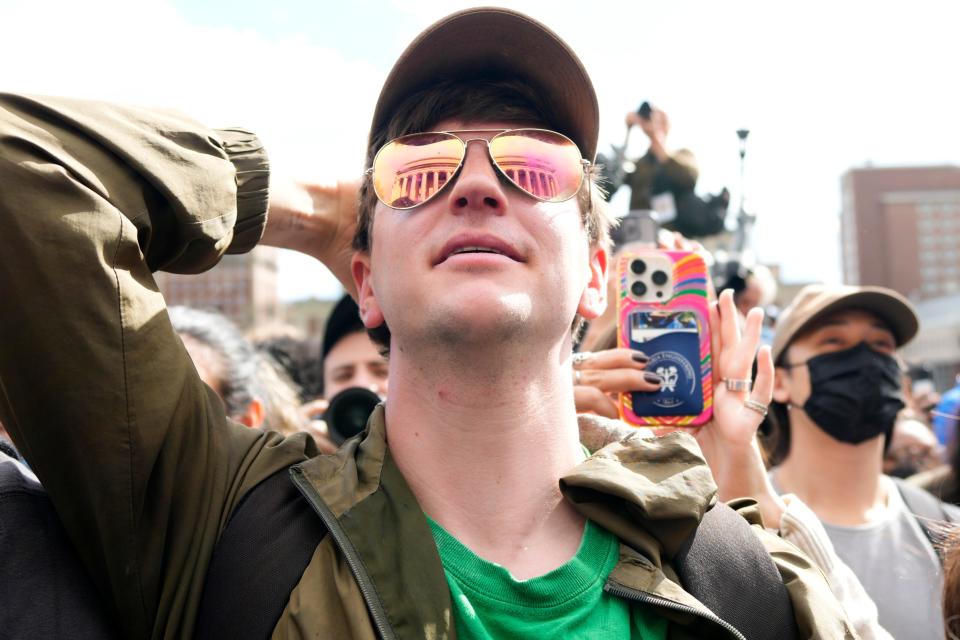
Several days ago, a group of pro-Palestinian protesters at the encampment gathered to force several Jewish students to move away. Keep in mind that the Jews who were targeted were enrolled at Columbia University; they had the right to be on their campus. Nonetheless, they were forced to move from a spot on that campus.
A video of the incident captures one of the encampment’s leaders calling out, “Attention everyone: Can I get everyone to form a human chain? We have a Zionist at the entrance of our encampment.”
That’s not all.
Opinion: Jewish students told to flee Columbia campus. How does that happen in America in 2024?
Jewish students at Columbia — not to mention other universities — say they have been verbally harassed (and sometimes physically harassed) as they walk to class or to the library. And during a recent counterprotest by Columbia’s Jewish students and others supporting Israel, the encampment’s “residents” held a sign that referred to the Jews as “al-Qassam’s next targets.”
For those not steeped in Middle East lingo, “al-Qassam” is the name of the Hamas military wing, which not only carried out the massacre, rape and abduction of more than 1,200 Israelis last Oct. 7 but also has been linked to scores of other terrorist attacks over the past four decades. The Hamas operative I interviewed in that Israeli prison years ago was considered an al-Qassam commander.
Sometimes the antisemitism is not even coded, though. The Atlantic magazine reported that last Sunday evening several men riding in two cars cruised along the edge of the Columbia campus, yelling this message from the open windows: “Yahud, Yahud,” followed by a common, four-letter epithet that begins with the letter “f” and is accompanied by “you.” By the way, "Yahud" is Arabic for Jew. Get the message?
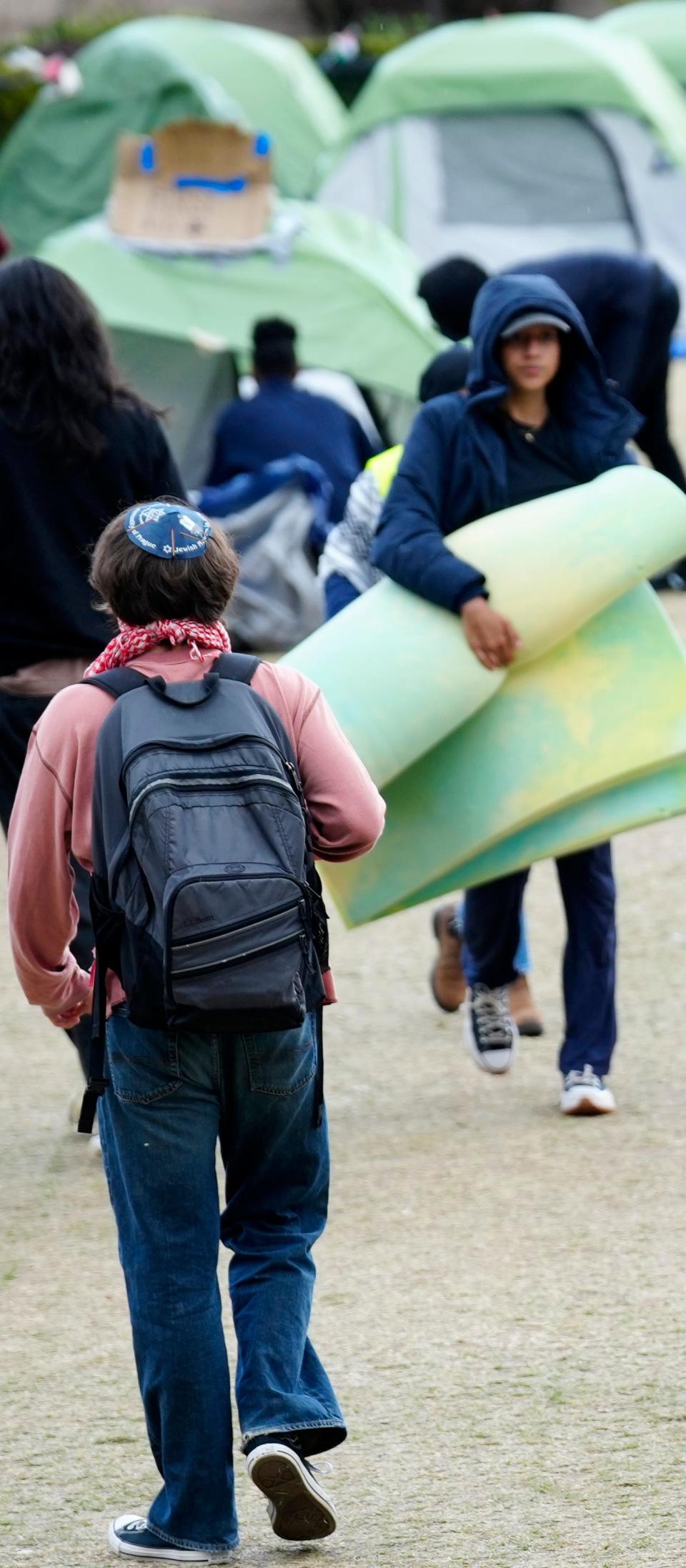
As if that’s not enough, consider the chanting of “Palestine will be free, from the river to the sea” that has become something of a soundtrack at most pro-Palestinian rallies, not just at Columbia but elsewhere. For many Jews, the chant is regarded as a none-too-subtle coded call for the eradication of Israel as a Jewish homeland. In other words, a new holocaust of the nation established by the United Nations after World War II to protect Jews in the wake of the Nazi Holocaust.
All this peaked in recent weeks as Jews prepared to celebrate Passover, which commemorates the freedom of the ancient Israelites from slavery in Egypt. At Columbia, a rabbi, perhaps with a sense of bitter irony amid the Passover holiday, advised Jewish students simply to leave campus and “return home” rather than stick around for the symbolic slavery of more insults.
By Monday, Columbia’s administration instructed students that they had the option of attending their final week of classes in a “hybrid” fashion — meaning they could dial in with a Zoom-like, virtual link or take the risk of walking to class and enduring whatever wisdom the People’s University of Palestine could pass on.
So this is what we have come to: rabbis telling Jewish students to leave so they can remain free and safe at a university that claims to be a safe beacon of academic freedom. And meanwhile, that same university, which charges more than $89,000 a year in tuition and fees, tells the students who remain on campus that they don’t really need to attend their final week of classes in person.
With this kind of atmosphere, graduation in a few weeks should be lots of fun, no?
Mike Kelly: At Cornell, how did the debate on the Israel-Hamas war nearly turn violent?
Bigotry, free speech and academic freedom intersect
On Monday, Columbia’s president, Nemat “Minouche” Shafik, issued a statement in which she acknowledged (finally) the growing problem of antisemitism on her campus.
“Over the past days,” Shafik said, “there have been too many examples of intimidating and harassing behavior on our campus. Antisemitic language, like any other language that is used to hurt and frighten people, is unacceptable and appropriate action will be taken.”
But like so many critiques of the Israeli-Palestinian conflict, Shafik’s statement was framed as a balancing act, with references to the pain that both sides feel. She has been trying to please so many sides in this debate that a variety of disparate groups at Columbia, along with a growing list of political figures who range from Sen. John Fetterman, the liberal Democrat from Pennsylvania, to House Speaker Mike Johnson, the conservative Republican from Louisiana, have called on her to resign.
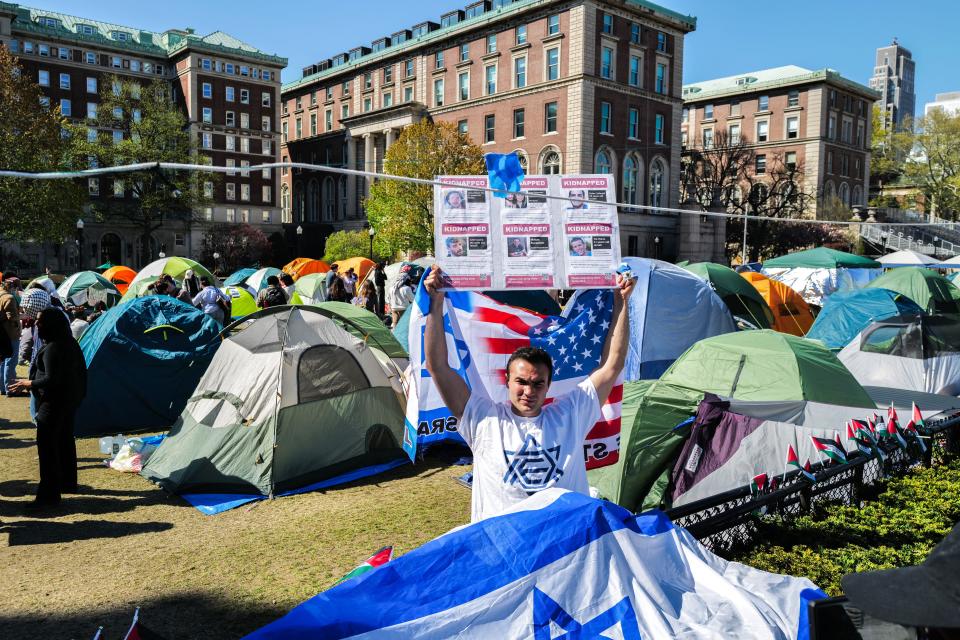
“There is a terrible conflict raging in the Middle East with devastating human consequences,” Shafik said. “I understand that many are experiencing deep moral distress and want Columbia to help alleviate this by taking action. We should be having serious conversations about how Columbia can contribute.”
I respect the reasoning behind messages that address the scars and guilt of both sides. Israel, which has endured far too many attacks on its people, is also responsible for far too many misdeeds against Palestinians. The same is true of Palestinians against Israelis. The tit-for-tat litany is so long that it’s impossible to figure out who inflicted the first wounds.
And while it's important to face up to antisemitism, we also can't ignore the fact that Islamophobia has also become a dispiriting fact of life on many campuses — though hardly in the same proportion as antisemitism. A variety of sources cite more numerous instances of antisemitism. Muslim students also say they have been unfortunate victims of "doxxing" — the sharing of personal information on the Internet — after attending pro-Palestinian protests to punish participants. In many cases, the doxxing of Muslims is the work of pro-Israel supporters — not exactly a prescription for improving relations. None of this is encouraging.
What’s remarkably striking, however, is how few people on either side can acknowledge the pain of the “other.” This has become especially difficult now.
Few pro-Palestinian leaders, even here in the safety of America, dare to mutter a syllable of criticism about the barbarism inflicted by Hamas last Oct. 7. And progressive feminists across America — many of them non-Muslims — have been embarrassingly silent about the serial raping and sexual assaults by Hamas on Israeli women during the Oct. 7 attacks.
Likewise, criticism of Israel’s brutal military assault on Gaza — including the deaths of so many children — is rare among Jews now, especially Jewish religious leaders.
In fairness, however, it’s not uncommon to find a handful of liberal Jews marching for pro-Palestinian causes, whereas it's almost unheard of to find Muslims standing shoulder-to-shoulder with Jews as they criticize Hamas. A few Jewish students even participated in the People’s University of Palestine encampment at Columbia University. And last month, Senate Majority Leader Chuck Schumer — the highest-ranking Jewish elected official in America — risked his political skin by publicly criticizing Israeli Prime Minister Benjamin Netanyahu.
But here in America, another set of guardrails needs to be erected, starting with the need for universities — and other institutions — to call out antisemitism when it happens.
Sadly, far too many universities, claiming to be brave epicenters of education, have become harbors of cowardice. On Tuesday, a sign proclaimed that the People’s University of Palestine encampment was a “liberated zone.” Another sign claimed that “Columbia is complicit in genocide.”
Education should never make room for verbal assaults on people — or threats of physical assault. And yet, that is precisely what far too many universities, including Columbia, have done with the Israeli-Palestinian conflict.
It’s entirely fair and important to critique Israel’s military strategy, especially the seemingly indiscriminate bombing of civilian neighborhoods. Likewise, it’s important to critique the militancy of Hamas. But it’s not fair to allow such debates to become fulcrums for bigotry — all under the rhetorical camouflage of so-called academic freedom.
Columbia is now trying to prepare for a graduation of seniors whose high school graduations were largely canceled or severely curtailed by the COVID-19 pandemic.
Now another kind of pandemic rages.
Will Columbia have the courage to face it?
Will the rest of America’s colleges?
Mike Kelly is an award-winning columnist for NorthJersey.com, part of the USA TODAY Network, as well as the author of three critically acclaimed nonfiction books and a podcast and documentary film producer. To get unlimited access to his insightful thoughts on how we live life in the Northeast, please subscribe or activate your digital account today.
Email: kellym@northjersey.com
This article originally appeared on NorthJersey.com: Columbia University encampments are fueling antisemitism

